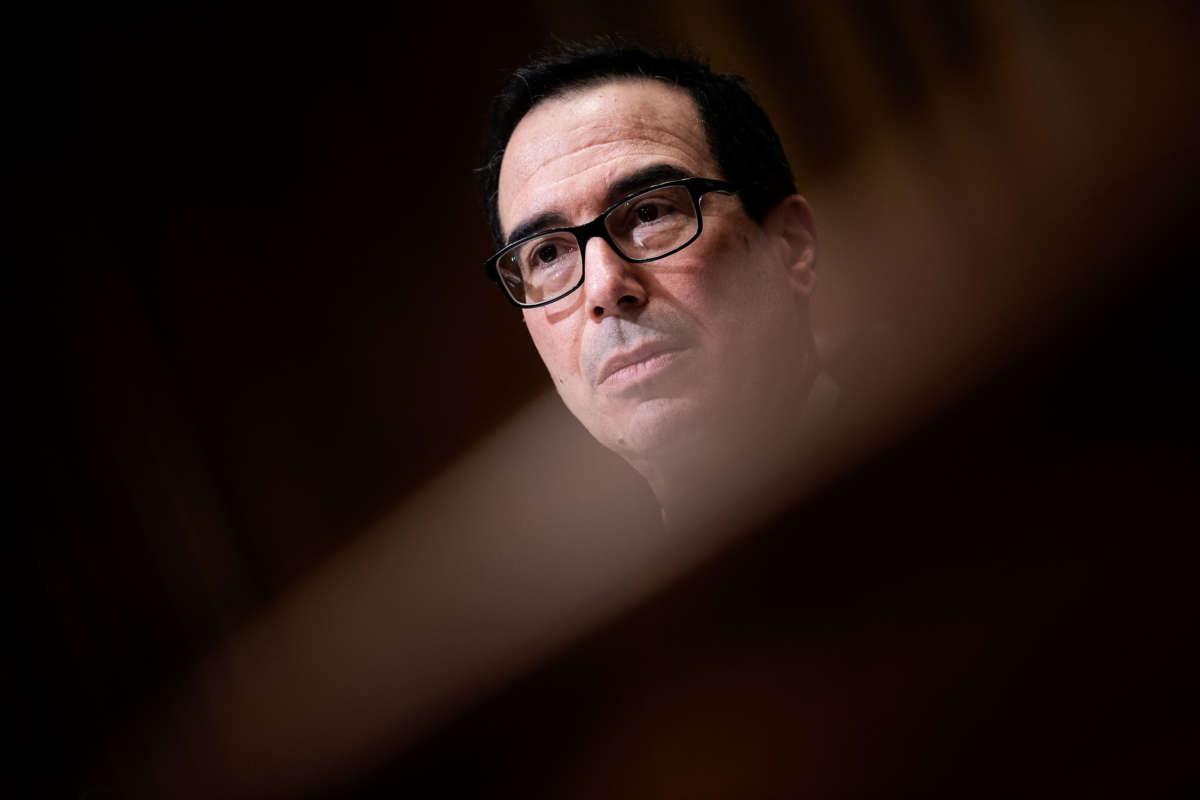Did you know that Truthout is a nonprofit and independently funded by readers like you? If you value what we do, please support our work with a donation.
During a Senate Finance Committee hearing on Wednesday, Treasury Secretary Steve Mnuchin — using euphemistic language Democratic lawmakers described as “Washington-speak” — admitted that President Donald Trump’s fiscal year 2021 budget proposal would cut Social Security days after the president insisted he is “not touching” the program.
Pressed by Sen. Catherine Cortez Masto (D-Nev.) on the budget’s call for tens of billions in cuts to Social Security over the next decade, Mnuchin said, “I believe it’s not a cut, it’s a reduction in the rate of increase. And it’s not to the benefits of people on Social Security.”
“If that is not a cut, then I would love to talk to you about what it is this administration values and what they see, how these groups and important individuals in our communities are being affected,” responded Cortez Masto. “My concern is this administration says one thing, but their actions are just the opposite.”
Sen. Ron Wyden (D-Ore.), ranking member of the Senate Finance Committee, tweeted in response to the exchange that “Mnuchin admits Trump’s budget cuts your earned benefits in Social Security.”
“‘Slowing the rate of increase’ is Washington-speak for cutting benefits and breaking the Social Security and Medicare guarantee,” Wyden added.
The Trump admin claims there are no cuts to Social Security in the budget. So why wouldn't Sec Mnuchin answer a simple yes or no question about whether there are billions in cuts to Social Security, hurting seniors?
Answer: because there are cuts to Social Security in the budget pic.twitter.com/hS503RrSe0
— Senator Cortez Masto (@SenCortezMasto) February 12, 2020
Alex Lawson, executive director of progressive advocacy group Social Security Works, told Common Dreams that “only a true creature of Wall Street could try telling people that even though they are getting less money it isn’t ‘really’ a cut.’
“When Steve Mnuchin or any other politician says that a ‘reduction in the rate of increase’ is different than a benefit cut, they are shamelessly lying,” Lawson said. “If Social Security benefits were to stay flat every year, they would quickly begin losing value due to inflation. We need to make annual cost-of-living adjustments more generous, not less.”
“Social Security’s total spending also increases yearly due to growth in the population of beneficiaries, something that the program’s actuaries have known about and planned for decades in advance,” added Lawson. “Any ‘reduction in the rate of increase’ would lead to benefit cuts.”
Mnuchin’s comments came days after Trump said following the release of his $4.8 trillion budget on Monday that he is “not touching Medicare” and “not touching Social Security.”
But the president’s plan calls for billions in cuts to both programs. The budget specifically targets the Social Security Disability Insurance (SSDI) program with nearly $30 billion in cuts over the next 10 years.
“The administration argues the SSDI cut isn’t really a ‘Social Security’ reduction: White House budget documents omit the disability program’s name, describing SSDI as a ‘federal disability program,'” HuffPost reported Wednesday. “But these are cuts nonetheless.”
Trump's budget is one of his cruelest proposals yet. It would:
— Cut $850,000,000,000 from Medicare
— Cut $270,000,000,000 from Medicaid
— Cut $30,000,000,000 from Social Security
Swing voters, if you're listening: Take note of where Trump's priorities lie.
— Robert Reich (@RBReich) February 10, 2020
During his opening statement at Wednesday’s hearing, Wyden called Trump’s proposed budget “a perfect snapshot of this administration’s policies robbing working families to pay off special interests and those at the top.”
“This administration’s budget is built on policies that pillage working families to pay for brand new windfalls for corporations and the wealthy,” said Wyden.
Press freedom is under attack
As Trump cracks down on political speech, independent media is increasingly necessary.
Truthout produces reporting you won’t see in the mainstream: journalism from the frontlines of global conflict, interviews with grassroots movement leaders, high-quality legal analysis and more.
Our work is possible thanks to reader support. Help Truthout catalyze change and social justice — make a tax-deductible monthly or one-time donation today.
